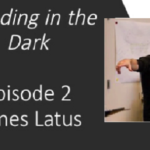


I joined the stage management team for the Radio City Christmas Spectacular in the fall of 1991. The show that year was the one they’d been doing for a number of years with no changes. The crew was the same, the sets and lights were the same; I was the newbie. I studied hard to learn to call the show (to this day, the most difficult show I’ve ever called). Finally, the day came to solo my first time. I was nervous but had the support of everyone I was working with. The first compliment came when I cued the snow for a scene and the fly floor dumped snow on my head as I was calling – they knew it would not rattle me and they were right. But the best compliment came at the end of the show when the show electrician, Marty Fuller, came back after and said: “You called a great show! You called all the cues just where we DO them!” I have carried that as a badge of honor ever since.



The Stage Managers’ Association of the United States (SMA) is pleased to announce Standing in the Dark: A Series of Conversations with Prominent Stage Managers. This exciting initiative, a continuation of the SMA’s “Legacy Project,” will be featured on the Association’s website in both podcast and video format.
The Legacy Project has been in development for the past few years under the leadership of the SMA Chair Elynmarie Kazle who has been working to create a structure for the concept and a way of preserving these important voices. It was originally conceived as a series of video conversations. Standing in the Dark, is a series of audio recordings of prominent stage managers and was created by Rachel Zucker, who envisioned this project as her MFA stage management thesis at Columbia University. The two efforts will be combined as Standing in the Dark: A Series of Conversations with Prominent Stage Managers. Last spring, Zucker contacted the SMA to see if there was interest and support for the continuation of her undertaking beyond graduation and the board of the Stage Managers’ Association has given its full support to the collaboration.
“One would think that stage managers, who are the backbone of the theatre industry, on Broadway and beyond, would have a rich written and/or oral history devoted to their work but unfortunately very little exists,” according to Zucker. “That’s what really inspired me to propose this as a thesis project, which eventually became Standing in the Dark. I believe it is important to hear their own words and voices, how these stage managers got to be where they are today.”
Michael J. Passaro, Associate Professor of Professional Practice (and Rachel’s advisor) at Columbia University, was supportive of Rachel’s venture from the start. “When I begin to advise my students on their thesis projects, I ask them a few questions to focus their thinking: What’s missing? What isn’t available to them, or doesn’t currently exist, in the world of stage management theory or practice? What do they wish they had in terms of a resource that will help them – and future stage managers – be better at what they do? Rachel’s proposal crossed my desk and I wrote one word on it: YES!”
In the next few weeks, ten audio podcasts compiled by Zucker will be rolled out on the SMA website along with the first video podcast. According to Hope Rose Kelly, the Stage Managers’ Association Website Editor in Chief, the podcasts will feature conversations with Bonnie Panson, Michael Passaro, Buzz Cohen and Arturo Porazzi, among others. The first video podcast will feature premiere Broadway stage manager and invererate hiker, Bob Bennett.
“I speak for many of us I’m sure” continued Passaro, “when I wish that legendary voices such as Ruthie Mitchell, Biff Liff, Beverley Randolph and many others were part of this series [who are no longer with us]. There’s no better organization than the SMA to foster the continuation of Rachel’s work and to ensure this incredible history is available to future generations of stage managers.” Speaking for the SMA, Kazle says, “By working together, we can create a cohesive history for our profession. It is our hope to make this available through our network to future generations of stage managers.” To nominate a stage manager. Go to I WANT TO (on stagemanagers.org) and click on NOMINATE A STAGE MANAGER FOR THE LEGACY PROJECT.
Usually when a backstage track has been established, you keep to it to be consistent. Every so often some arises where you must go off track. Then there are those rare moments when you go off track and you don’t know why until something does happen to explain it. For me, I was ASMing “A Midsummer Night’s Dream” and I was curious about a part of the show from a particular backstage perspective – the theatre this was in was shaped like a classic Greek theatre – stage thrusts out, downstage entrances are voms that go deep to the backstage area. The walls of these voms had wide ledges and our Oberon was staged to sit on one while Puck told him what he did to Titania which resulted in Oberon laughing so hard that he would fall off the ledge into the vom. Puck is worried but then Oberon would bound out to congratulate him. Early in the preview process, I had a bit of free time and rather than just passing by this vom to go directly to my next stopping point, I stood by to watch Oberon drop into it. He dropped only rather than bouncing back up, he began crawling towards me – realizing he must have landed wrong and broke something, I instantly radioed up to my SM to tell her the actor was injured and to stop the show which she did. We tended to the actor till the ambulance arrived and needless to say the performance did not continue that evening.
My favorite shows tend to be farces or ones with fast costume and scene changes like “The 39 Steps” or “Compleat Work of Shakespeare Abridged”. And when you work on a show where you are constantly moving around backstage, any troubleshooting that arises needs to happen on the go. So when we started Act 2 of “The Hound of the Baskervilles” and we didn’t hear the “plop” of the dummy body drop to the stage from the grid when it was supposed to – a crucial prop piece that would show up again in a scene following the one we were about to change into – the troubleshooting commenced as we readied ourselves to go onstage to set the next scene. The plan I came up with was to send the wardrobe person to get a spare costume suit from the dressing room after she did the scene change and then we would grab some pillows from the green room and stuff them into the suit thereby creating a makeshift dummy. After quickly imparting that plan to wardrobe and the PA, we popped out for the shift and as I rolled off a set piece – hands full with Dr. Watson’s medical instruments – the actor playing Holmes grabs me and whispers in my ear “The dummy didn’t drop!” – to which I quickly whispered back, “we know, we have a plan” and we moved on. Wonderful thing about the show is that there is room for ad libbing so when we tossed the makeshift dummy out onto the stage, the actors had to take a moment to laugh and comment with the audience.
